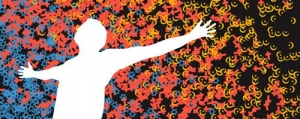Talking To Strangers
By Timothy Radcliffe, OP

Whenever I set off on a trip, the hardest decision is as to what books to take with me. What can I read in the planes and waiting in the airports to save me from brain death? And so on my last trip, already becoming a bit nervous about having accepted to address you, I decided to take Newman's The Idea of a University. His definition of the purpose of a university will probably seem vastly over optimistic to us. The university exists, he writes, to educate the intellect to reason well in all matters, to reach out towards truth and to grasp it."(1) There is a wonderful Victorian confidence about that statement: "to reach out towards truth and to grasp it." It may smack of intellectual arrogance to us.
Yet what I found fascinating was Newman's description of how the university trains us to reach out for the truth. He wrote, "We know, not by a direct and simple vision, not at a glance, but, as it were, by piecemeal and accumulation, by a mental process, by going round an object, by the comparison, the combination, the mutual correction, the continual adaptation of many partial notions, by the employment, concentration, and joint action of many faculties and exercises of mind."(2)
The process of seeking the truth, then, is not for Newman through the direct and univocal perception of some single vision, but a much more tentative, fumbling, humble approach, trying to feel one's way through "many partial notions." This is evocative of what has been my own experience in trying to understand spiritual texts. You cannot march in and claim their meaning with the aid of some grand theory. Study is much more like sneaking up on the meaning of the text, trying this approach and then another, inching one's way towards understanding. You may begin with a historico-critical approach and then a moment comes when you feel that this is not yielding anything more, and you try to slide upon the text from a sociological perspective; then maybe the time has come for a bit of literary analysis. To take an image from Wittgenstein, you must be like a carpenter who knows when to use each tool in the bag; when to use a hammer and when a chisel; when you need glue or when to use a screwdriver.
Creeping up on the truth of a text, or a person, or anything else, is always a matter of letting oneself be thrown by "The Truth's superb surprise." It is letting oneself be astonished, discovering that one did not know in advance what was to be discovered.
Our society is marked by a deep distrust of all teachers. Nicholas Lash, from Cambridge, wrote (in the book that I took on my last trip to Burundi): "The Enlightenment left us with what we might call a crisis of docility. Unless we have the courage to work things out for ourselves, to take as true only that which we have personally attained or, perhaps invented, then meanings and values, descriptions and instructions, imposed by other people, feeding other people's power, will inhibit and enslave us, bind us into fables and falsehoods from the past. Even God's truth, perhaps especially God's truth, is not exception to this rule. Only slaves and children should be teachable, or docile."(3)
Perhaps the first requirement of a good university teacher is that he or she refuses to be a guru, to be the one who knows what St. Thomas Aquinas, (and as a good Dominican I must mention him at least once a lecture) strongly maintained: that no one can, strictly speaking, teach anyone anything. The angelic Doctor loved to quote the "no one your Master."(4) All that the teacher can do is to accompany the students in their process of discovery.
So, in an age of agnosticism and ayatollahs, the role of the university is to be the place where we learn that the truth may be sought. It is not to be captured with the cleanness of a single vision, but sneaked up on, through many partial notions, many inadequate theories, through all sorts of tools, and it comes to us finally as a surprise and a gift. In that sense, it is the paradoxical role of the university teacher to introduce us into the humility of learning. Not because we must learn to submit to a teacher, but because the teacher shows him or herself to be someone just on the way, the doctor as fellow disciple. Jordan of Saxony, Dominic's successor as Master of the Order, said of Dominic that he understood everything "humili cordis intelligentia,(5) through the humble intelligence of his heart.
I am not suggesting that universities are the only places in which we may be initiated into this truth seeking. Families, monasteries, women's groups, guilds, religious orders, schools of artists, all these should be places of learning too. But since the thirteenth century, the university has been a central place for keeping alive this hunger for truth.
Clearly, if the university assumes this role of refusing the single visions that rule this world, whether communist or consumerist, then it will need a real independence of heart and mind. Like Diogenes, we must be prepared to say to Alexander, "Get out of my light." In his book, Living in Truth, Vaclav Ravel, the president of the Czech Republic, asserts that in the culture of lies which ruled his country before the fall of communism, the most daring political act was to speak the truth. He gives the example of the greengrocer who dares to remove the sign from his shop window which says "Workers of the World, Unite." Because he refuses to say what he does not believe, then that greengrocer becomes a threat to his whole world and an enemy of the State.
So far, I have taken a first step of arguing for the importance of universities as places of resistance to the imperialism of the single vision. The university teacher should induct us into the necessary tentativeness, hesitancy, and even humility which is central to our approach to truth. We need a multiplicity of crafts and skills, lots of tools in our bag, and not the pretensions of one big sledgehammer of a theory.
How can we learn to talk to strangers? What conversation can we initiate with those who are different? And what role can the university play in preparing us for this dialogue?
The most dramatic experience that I have had of the pain of dialogue was indeed in Burundi some two years ago. It was during the first explosion of violence, which killed perhaps as many as 100,000 people. That would be as if four million people were killed in the USA. It was the old conflict between Cain and Abel, between the semi-nomadic Tutsis with their cattle, and the peasant farmers who are Hutus. Our brothers in Burundi come from both ethnic groups, and all had lost brothers and sisters and family. The struggle was to witness to the gospel by somewhere staying together. I visited the country with the local superior, a Tutsi, and a member of the General Council of the Order, who is a Hutu. Before I left we gathered everyone together to celebrate the Eucharist, the sacrament of unity. But what could we all say to each other? What was most important was what we could do, repeating the gestures performed by a man in the face of his betrayal and death. Each brother could and did talk of his suffering, of those who he had lost, so that they were joined in the suffering rather than divided by it.
One of the functions of the church, and of a religious Order, is to try to be present in those places of deafness and incomprehension, to offer a space where conversations may begin. I think of an ecumenical community I visited in Belfast, which was literally on the frontier between the tribal lands of Catholics and Protestants.
It was a place where quietly, slowly, a few brave souls could try to knit some common language. It was, above all, the women who had the courage to do this.
But how in these hard places can we learn to talk to strangers? I wish to suggest the university should be one of the places in which we learn to talk to those who are different. Steiner wrote, "Apprehension (the meeting with the other) signifies both fear and perception."(6) The meeting of the other is a fearful moment, but it can become a moment of recognition, of understanding. Thinking can open my eyes to see the stranger and build the common human home.
Part of our apprenticeship is surely in learning to read texts written by strangers, and come to understand them. Struggling with St. Paul or Augustine, with Descartes or the texts of the French Revolution, requires of one an openness to the other. It is not unlike an education in friendship.
Nicholas Lash spoke of "the single-minded passionate disinterestedness without which no good scholarly work can be done." This word "disinterestedness" is worth pausing over. It suggests how the university should be the locus of an alternative perception of reality.
But in what sense does scholarly work offer a disinterested perception of things? It would be easy and wrong to mistake this for a distance, a disengagement from concern and commitment. That would be the "lack of conviction" of the best. And it is surely a temptation of the academic world to fall into a sort of critical detachment which frees our hearts from risks of engagement and commitment, in the name of intellectual freedom. Faced with our messy violent world we may claim a scholarly detachment which justifies keeping one's hands clean. When D.H. Lawrence went to Cambridge and met the group of philosophers gathered around Russell he was shocked: "What does Russell really want? (he asked) He wants to keep his own established ego, his finite and ready defined self intact, free from contact and connection. He wants to be ultimately a free agent. That is what they all want, ultimately ... so that in their own souls they can be independent little gods, referred nowhere and to nothing, little mortal Absolutes, secure from question."(7)
Regardless of whether that it is just or not, and one could hardly call Russell uncommitted, it offers a wonderful image of the wrong sort of disinterestedness. There can be a detachment which insulates and protects, an academic carapace which makes one invulnerable and apart.
I suspect that the disinterestedness that Lash has in mind is quite other. It is a refusal to let one's perception of anything be dominated by an "interest." This is the temptation of any single vision. The Khmer Rouge did not see its prisoners as individuals, but were interested in them merely as functions of the wheel of history, actors in the great class struggle. The consumer society will not delight in the cow for its own sake, but see it as potential profit, unless it happens to be a sad mad English cow. In this culture of greed, then perhaps study requires of us a certain way of life, a certain freedom from acquisitiveness. We may have to learn to see things with unpossessive eyes. It is no coincidence that when Dominic founded an Order dedicated to study, he made poverty central to our way of life. I am not suggesting that all faculty members at Yale should take a vow of poverty though I would be happy to talk to anyone over drinks who wants to join the Order. The disinterestedness of the scholar is not the detachment of someone who holds back. It is more like the disinterestedness of friendship.
So learning to study the texts of strangers is part of my human formation, and forms me as someone who is capable of relating to another: another time, another view, another person. The Constitutions of my Order speak of study as hominum propensinem ad veritatem excollant, "the cultivation of humanity's natural inclination to the truth." This propensio ad veritatem, the inclination to truth that we need to cultivate, is not just a human desire to know many things, but a natural human desire to reach out to those who are different, to break the tight hold of our egocentricity, a solipsistic self-obsession. It wakes us from the illusion that we are the center of the world. Whether we are studying the ending of Mark's gospel or the sexual habits of a rare snail, our eyes are being opened to see what is other. Study is ecstatic.
I would even go so far as to say that study can touch and heal the deepest hunger of the human being, which is to love. The perception of the other belongs to loving them. As Simone Weil wrote, "On ne reconnait pleinement l'existence que de ceux que l'on aime."(8)
For example, Augustine's conversion to Christianity was both a falling in love and a moment of understanding. It was an intellectual act and a transformation of his heart:
"Late have I loved you, O beauty so ancient and so new; late have I loved you... I tasted you and I now hunger and thirst for you; you touched me and I have burned for your peace.
But that falling in love came from hearing a child command him to read a text: Tolle lege, tolle lege, "Take and read." As Angela Tilby said,
"Without books, without reading, our understanding is uniformed, our judgments narrow... I sometimes think that God would rather we were literate than, I that we were indiscriminately caring. Augustine found his true self through a child's cry and a challenging text. He met the living God on the page of a book, and it broke his heart and set him free."(9)
But if universities are to train us in the delicate art of talking to strangers, then it is not enough that we struggle with texts and try to understand the dead. Ultimately a university will contribute to the building of human community and to the art of dialogue if we are able to talk with each other. Newman once wrote that if he had to choose between a university with highly trained professors, rigorous examinations and which taught the pupils lots of facts, or one in which a lot of young people merely met and debated with each other, then he would without hesitation choose the latter. Because the primary function of a university is to teach us to be social beings, able to talk, to listen and learn from those who are different.
This is a wonderful idea. Yet in my experience this can be hard. Even here, where we are all supposed to be rational and intelligent, dialogue can be hard. Row far are we able to argue with our colleagues, and seek the truth together? Row open are we to having favorite theories questioned? Perhaps the greatest challenge that universities face, if they are to contribute to the healing of our bruised world, is to learn that pleasure of debate with those who are different.
When I was a young Dominican student we still sometimes practiced a version of the medieval disputatio. This was a form of debating central to the life of the thirteenth century university, and it embodies a vision of what a university should be about. It does not seem to have been practiced often by the Inquisition, but it represents an ideal which has something to offer us. In the disputatio the aim was not so much to demonstrate that your opponent was utterly and in every way wrong, and to be derided and dismissed as a fool. Instead you had to show the limited sense in which he was right. If someone were to assert that "Yale Department of Religious Studies is better than the Theology Faculty of Oxford," I might reply in making a distinction: "That Yale is better as far as sociological analysis I accept; that it is better in every way I deny." The aim was, through disagreement and mutual criticism, to arrive at a common truth, that was able to accommodate what was true in each position.
Perhaps even in universities we have been seduced by a competitive form of debate, which is as blind and violent as the struggle of the species to survive in the Darwinian jungle, or as senseless as the struggle for mastery between Coca Cola and Pepsi Cola. But we are called to be a place of counter-culture, of a different way of relating, through which one believes that one may learn something from those with whom one disagrees. This requires of us compassion and vulnerability. Iris Murdock said that when we disagree with someone else, we must ask of what they are afraid. How can we enter their perception of things, and rescue what is right and true from what is wrong and misguided?
1. The Idea of a University. J.H. Newman. Discourse V1.1.
2. J.H. Newman, Discourse VII.1.
3. Believing Three Ways in One God, Nicholas Lash, London, 1992, p lO.
4. e.g., De Veritate, xi.I.ad i.
5. Libellus 7.
6. ibid., p 139.
7. quoted by Fergus Kerr OP, Theology after Wittgenstein, Oxford, 1986, p 60. Russell seems to represent both the best and the worst! A man who was passionately committed to causes, and yet who was accused of having, and feared himself to have, a contempt for humanity.
8. Cahier II, Paris, 1953, p 227.
9. Thought for the Day, BBC Radio 4, 13 May 1996, quoted in The Tablet, 5 June 1996, p 792.
(An Address Given to Yale University)


